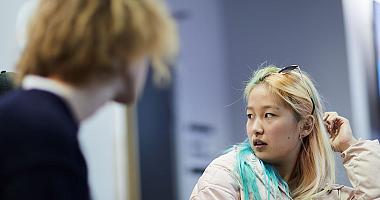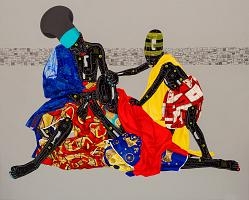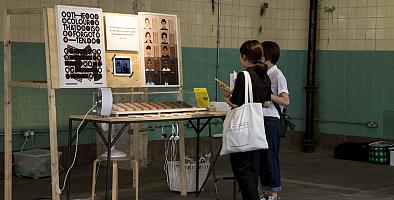MA/MSc
Digital Journalism
Content navigation menu
Why study MA/MSc Digital Journalism at Goldsmiths
With an industry-informed curriculum, this future-focused MA combines computing and media and communications to reflect digital journalism at its most current.
- Imagine getting your work recognised by Tim Berners Lee, having your project featured in the The New York Times, or winning the Guardian’s student digital journalist awards. These are the kinds of things that happen on this dynamic programme.
- It’s really important for us that you graduate with a set of core digital journalism skills so half of the degree focuses on the computing side of the discipline and half on media and communications. This means you get a holistic MA, where you study the foundations of digital journalism and practise it in its most current forms.
- From delivering news on wearables, to the latest developments in live reporting, the questions we ask are informed by an industry panel featuring the heads of digital at organisations including The Guardian, the Financial Times, and the BBC. We want to define the transformative nature of digital journalism so we explore critical and entrepreneurial approaches and get hands-on, experimenting with the latest journalistic innovations.
- You’ll have the chance to study multimedia and interactive journalism, look at interactive documentaries, data journalism, digital reporting, and video journalism. You’ll learn coding and data analysis techniques, so you can get to grips with web production, data-led investigations and using visualisation in stories. Modules cover specialist skills such as OSINT, verification, generative AI, machine learning and social media analysis to monitor what’s going on behind the screens and break new stories.
- Through our partnerships with BBC news labs and The Times’ development team, we make sure we’re keeping up with industry but also working with it.
- We want you to reimagine the medium while you’re here, so you get the chance to specialise in your own area of interest for your final project. This could be anything from an interactive website to a video production using interactive story telling and text. We offer a lot of support when it comes to the coding side of the course. before the start of the programme gives you an introduction to some of the techniques and languages.
- What you go away with are the core skills for news writing, video, and computational techniques and some amazing industry contacts.
- This degree is part of our School of Journalism.
- The Department of Media, Communications and Cultural Studies has been ranked second in the UK for 'world-leading or internationally excellent' research (Research Excellence Framework, 2021) and 16th in the world (third in the UK) in the 2024 QS World Rankings for communication and media studies.
Contact the department
If you have specific questions about the degree, contact Miranda McLachlan.
Length
1 year full-time or 2 years part-time
Entry requirements
Undergraduate degree of at least 2:1 standard in a relevant subject. Applicants with significant work experience and/or a qualification in a computing, digital technology or social science-related subject are encouraged. See below for full information on entry requirements
Fees
Home - full-time: £12520
Home - part-time: £6260
International - full-time: £18560
Departments
What you'll study
Overview
The degree consists of modules taught by The Department of Media, Communication and Cultural Studies and the Department of Computing in a truly interdisciplinary and collaborative style.
You will take the following modules:
| Module title | Credits |
|---|---|
| Data Journalism and Visualisation | 15 credits |
| Media Law, Regulation and Ethics | 15 credits |
| Critical Social Media Practices | 15 credits |
| Multimedia Journalism | 30 credits |
| Journalism in Context | 15 credits |
| Digital Sandbox | 30 credits |
| MA/MSc Digital Journalism Major Project/Dissertation | 60 credits |
Assessment
You are required to undertake and pass every element of the programme. Each module is individually assessed using a variety of provisions including digital projects, written work, and exam.
Digital bootcamp
Students without a technical background will be encouraged to take our pre-session Digital Bootcamp in September to gain basic literacy in digital fundamentals, and to get to know fellow students.
Entry requirements
You should have (or expect to be awarded) an undergraduate degree of at least upper second class standard in a relevant/related subject. Applicants with significant work experience and/or a professional qualification in a computing, digital technology or social science-related subject are encouraged.
You might also be considered for some programmes if you aren’t a graduate or your degree is in an unrelated field, but have relevant experience and can show that you have the ability to work at postgraduate level.
International qualifications
We accept a wide range of international qualifications. Find out more about the qualifications we accept from around the world.
If English isn’t your first language, you will need an IELTS score (or equivalent English language qualification) of 7.0 with a 7.0 in writing and no element lower than 6.5 to study this programme.
If you need assistance with your English language, we offer a range of courses that can help prepare you for postgraduate-level study.
How to apply
Apply directly to Goldsmiths using our online application system
Before submitting your application you’ll need to have:
- Details of your academic qualifications
- The email address of your referee who we can request a reference from, or alternatively a copy of your academic reference
- Copies of your educational transcripts or certificates
- A personal statement – this can either be uploaded as a Word Document or PDF, or completed online. Please see our guidance on writing a postgraduate statement
You'll be able to save your progress at any point and return to your application by logging in using your username/email and password.
When to apply
Applications are open from October, and interviews typically occur from February. Although there is no deadline for applications, we encourage you to apply early.
Find out more about applying.
Fees and funding
Annual tuition fees
These are the PG fees for students starting their programme in the 2024/2025 academic year.
- Home - full-time: £12520
- Home - part-time: £6260
- International - full-time: £18560
If your fees are not listed here, please check our postgraduate fees guidance or contact the Fees Office, who can also advise you about how to pay your fees.
It’s not currently possible for international students to study part-time under a student visa. If you think you might be eligible to study part-time while being on another visa type, please contact our Admissions Team for more information.
If you are looking to pay your fees please see our guide to making a payment.
Funding opportunities
Football Writers Association (FWA) Bursary
The aim of the FWA Bursary is to encourage those students who come from backgrounds that are underrepresented in the industry.
Additional costs
In addition to your tuition fees, you'll be responsible for any additional costs associated with your course, such as buying stationery and paying for photocopying. You can find out more about what you need to budget for on our study costs page.
There may also be specific additional costs associated with your programme. This can include things like paying for field trips or specialist materials for your assignments. Please check the programme specification for more information.
Paying your fees
Find out about paying your tuition fees.
If you are a UK student you may be eligible for a postgraduate loan.
Meanwhile our Careers Service can also offer advice on finding work during your studies.
Careers
Our graduates have gone on to work within diverse roles from delivering communications for UNICEF in Bangladesh, to creating content for Rolling Stone magazine in New York.
This programme can help you develop your critical and analytical abilities as well as a great number of practical sought-after skills and competencies. It therefore can lead to many types of career including:
- Digital journalist
- Online editor at large news organisation
- Multimedia reporter
- Community/social media journalist or editor
- Project Manager for journalism projects
- Computational or Data Journalist
- Investigative journalist
- Interactive documentary producer
- Data mining specialist or Online Research Methods resource Entrepreneur/founder of
- media startup Web or Mobile designer
- Data visualisation specialist
- Video journalist
- Photojournalist
Suggested reading
Journalism
- Hicks Wynford and Tim Holmes, (2002) Subediting for Journalists, Routledge
- Kovach, B. & Rosenstiel, T. (2007) The Elements of Journalism. New York: Three Rivers Press
- McKane Anna (2007) News Writing, Sage
- Wolfe, T. (1975) The New Journalism. UK: Picador
- Lee-Wright, Angela Phillips, Tamara Witschge (2011) Changing Journalism, Routledge
- Liebling, A.J. (1961) The Press. Ballentine
- Malcolm, J. (1990) The Journalist and the Murderer. Knopf
- Kelly, J. (1999) Red Kayaks and Hidden Gold: Citizen Journalism Oxford: Reuters Institute for the Study of Journalism
- Phillips Angela (2007) Good Writing for Journalists, Sage
Digital Journalism
- Andre, P., et al, Who Gives a Tweet? Evaluating Microblog Content Value
- Christensen, C. Anthony, S. Roth, E. (2004) Seeing What’s Next: Using the Theories of Innovation to Predict Industry Change; Boston, MA; Harvard Business School Press
- Fenton, Natalie. New Media, Old News: Journalism and Democracy in the Digital Age. Thousand Oaks, CA: Sage, 2010
- Gillmor, D., We the Media; Grassroots Journalism by the People, For the People. Sebastapol, CA., O’Reilly 2004
- Luckie, Mark S. The Digital Journalist's Handbook. Lexington, KY: CreateSpace, 2010
- Negroponte, Nicholas. Being Digital. New York: Alfred A. Knopf, 1995
- Scott, B. (2005) A Contemporary History of Digital Journalism. Television and New Media 6 (1) pp. 89-126
- Shirky, Clay. Here Comes Everybody. New York : Penguin Press, 2008
Computing
- Haverbeke, Marijn (2011) Eloquent JavaScript. No Starch Press
- Janert, Philipp K. (2011) Data Analysis with Open Source Tools. O’Reilly
- Robbins, A. and Beebe, N.H.F. (2005) Classic Shell Scripting, O'Reilly
- Russell, Matthew A. (2011) Mining the Social Web, O'Reilly





